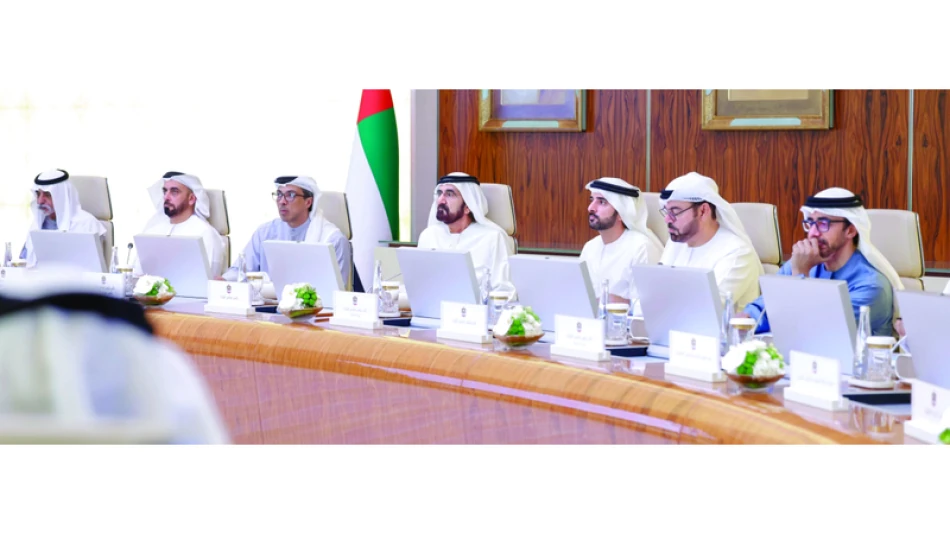
UAE Cabinet Approves National Policy for Economic Clusters Under Dubai Ruler's Leadership
UAE Launches $8 Billion Economic Clustering Strategy to Reshape National Competitiveness
The UAE Cabinet has approved an ambitious National Economic Clusters Policy designed to generate over AED 30 billion ($8.2 billion) annually in additional GDP growth by consolidating related industries and services across the seven emirates. The policy represents a strategic pivot toward specialized economic zones that leverage each emirate's unique advantages, from Abu Dhabi's energy resources to Dubai's financial hub status.
Economic Clusters: A Blueprint for Regional Dominance
The new policy targets five key sectors: financial services, tourism and hospitality, aerospace, telecommunications and data analytics, and food security. By creating geographic concentrations of related businesses and supporting institutions, the UAE aims to mirror successful cluster models like Silicon Valley's tech ecosystem or Singapore's maritime hub.
The strategy promises to create over 20,000 new jobs and boost foreign trade by AED 15 billion over seven years. More importantly, it positions the UAE to compete directly with established economic powerhouses by building critical mass in strategic industries.
Learning from Global Success Stories
This approach echoes Singapore's Jurong industrial cluster and Ireland's pharmaceutical corridor, where concentrated expertise and shared infrastructure drove exponential growth. The UAE's advantage lies in its federal structure, allowing different emirates to specialize while maintaining seamless integration.
For investors, this signals clearer sectoral focus and potentially more attractive incentive packages. Companies in targeted industries may find enhanced access to specialized talent, suppliers, and research facilities within designated clusters.
Healthcare Revolution: Integrative Medicine Gets Official Recognition
The Cabinet established the UAE Council for Integrative Medicine, led by Sheikha Salama bint Tahnoun Al Nahyan. This move legitimizes traditional and complementary medicine alongside modern healthcare, potentially creating a new medical tourism segment.
The global integrative medicine market, valued at $4.4 billion in 2022, is growing at 23% annually. The UAE's entry could capture significant market share from wellness destinations like Thailand and India, particularly given its advanced healthcare infrastructure and regulatory credibility.
Genomics Program Scales Rapidly
The UAE Genome Council reported impressive growth with over 750,000 participants in the national genome program and 8,500 trained professionals. The pre-marital genetic screening program now operates across 58 health centers, positioning the UAE as a leader in preventive genomic medicine.
This data advantage could attract pharmaceutical companies seeking diverse genetic datasets for drug development, potentially creating a new revenue stream from medical research partnerships.
Environmental Commitments Drive Aviation Sector Transformation
The Cabinet approved the third version of the National Aviation Emissions Reduction Plan, aligning with International Civil Aviation Organization standards. Given that UAE carriers Emirates and Etihad are among the world's largest international airlines, this commitment carries significant weight in global aviation decarbonization efforts.
The plan includes mandatory global reduction targets and sustainable aviation fuel initiatives. For the UAE's aviation sector, this means accelerated investment in clean technologies but also potential competitive advantages as environmental regulations tighten globally.
Cybersecurity Framework Adapts to AI Era
Updated cybersecurity policies now include AI security protocols, cloud security guidelines, and IoT protection measures. As the UAE positions itself as a global AI hub, robust cybersecurity becomes crucial for maintaining investor and user confidence.
The comprehensive update addresses emerging threats in an increasingly digital economy where cyber incidents can cause billions in damages. This proactive approach should reassure international businesses considering UAE operations.
Strategic Implications for Regional Leadership
These policy announcements collectively signal the UAE's determination to maintain its position as the region's most diversified economy. The economic clustering strategy, in particular, represents a sophisticated approach to industrial policy that goes beyond traditional free zones.
By concentrating resources and expertise, the UAE can build genuine competitive advantages rather than simply offering tax incentives. This approach should prove more sustainable as global tax policies evolve and competition for foreign investment intensifies.
Investment Outlook
For international investors, the clustering policy offers clearer sector-specific opportunities with enhanced ecosystem support. The healthcare initiatives create new market segments, while environmental commitments ensure long-term regulatory alignment with global standards.
The comprehensive approach across economic, healthcare, environmental, and digital domains demonstrates policy coherence that should boost investor confidence in the UAE's long-term strategic direction.
Most Viewed News

 Sara Khaled
Sara Khaled






